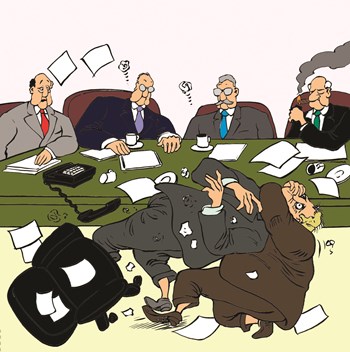
A community association or HOA is only as strong as its board. This is the elected body that will make all of the official decisions on behalf of residents – for a while, at least. Ideally, this term will fly by, as a benevolent and harmonious collective presides effortlessly over the association, its every action making residents rejoice.
Unfortunately, things are not always ideal, and a dysfunctional board can make its term feel, well...interminable. Whether be it through infighting, a tyrannical personality asserting undue influence over the organization, maliciousness or mismanagement, a dysfunctional board can sink an association mighty fast. Managers and owners need to be able to identify the telltale signs of a failing board quickly, or they risk loss of communal relations, funds, or – even worse – property value.
Breach of Duty
Boards have a fiduciary duty to act in the best interests of their association as a whole. Because of this, one could reasonably argue that the second a board becomes dysfunctional, it’s failing to serve its core purpose.
“I’m lucky to currently have a really good board of directors, but there are dysfunctional ones; we’ve all seen them,” says Christopher DeLong, a manager with CCMC, a community association management firm in Las Vegas. “I’ve had to come in after the fact to put together the pieces, and it’s unfortunate, because board behavior greatly impacts the residents of a community. It can devalue its property and create an atmosphere wherein people don’t want to live, which goes against the board’s greatest responsibility. So it’s crucially important that board members both understand their own roles, as well as those of others, like the community manager, the homeowners and the vendors. When they don’t understand these roles, or when they run for the board because they have an agenda or an axe to grind, that’s when the wheels start to come off the wagon.”
The bare minimum a board can do, should it want to stay on the straight and narrow, is to thoroughly review and understand its own governing documents. “When they don’t understand those or don’t abide by them, then go out and just decide willy-nilly what they want to do without community input, then the board is no longer making decisions in a transparent process,” DeLong warns. “A board must rely on vendor, manager or homeowner input.”
Buyer Beware
The responsibility of maintaining an association does not fall solely to the board. The homeowners, who choose those who will serve, owe it to themselves and their neighbors to make informed decisions and to keep their boards in check and on task. Board elections are regulated by Nevada state law, so while it may be possible to hold a special election if something goes spectacularly awry, it is quite difficult – and thus rare.
“I have seen a few conflicts where things get so bad that a board can’t approve a budget,” relates Coleen Crawford, owner of Desert Community Management in Las Vegas. “This means that they’re underfunded – and in Nevada, it’s a no-no to borrow from reserves to pay for operating items. Yet these things happen. And when they do, you have to put something in place to solve your issues. And the way that usually happens is, you get a new board.”
DeLong recommends that non-board owners regularly turn up to meetings, which is the best way for them to stay actively engaged. “Meetings are the best venue for owners to see what’s happening with their association,” he says. “If there’s any dysfunction within the board, it will rear its ugly head during the meeting. And this can take several forms: minimal legitimate debate prior to decisions being made; the impression that decisions are being made elsewhere, before or after meetings, and that the meetings themselves are simply a ruse wherein the members go through the motions; open animosity between board members; or board members simply quitting. All of those are good indicators of serious problems.
“And then, for the homeowner more educated in community affairs, they should start looking at minutes, [and association] records and financials,” DeLong adds. “Those will give you a good understanding as to what’s happening in the association, and the overall health of the community.”
A Hand to Right the Ship
Along with boards policing themselves, and residents being engaged and invested in their community’s governance, a dedicated community manager can also help nip dysfunction in the bud – or help get things back on track if they wander.
“With some exceptions, I would suggest that most boards do not start out dysfunctional, but become less effective over time due to a lack of professional managerial leadership,” says Bruce Heckman, general manager of Veer Towers in Las Vegas for Associa Nevada South. “Why is this? Several factors. First, until fairly recently, community association management was not considered a viable career that would attract the best and brightest. And not all states require certification and licensing for community managers. Nevada, as well as several others, requires certification licensing, continuing education, and re-certification every two years. This helps to ensure a more knowledgeable, confident and respected manager. Strong boards would have their way with a less-experienced manager, and feel that they have to take matters into their own hands. But, as volunteers, they are not – nor should they be – qualified to navigate the complexities of HOA law.”
Of course, association management is not without its difficulties, even for the seasoned professional. “As a manager, you’re trying to remain neutral and adhere to the law, because at the end of the day, that’s really what we care about,” notes Crawford. “Following the law, following the governing docs, and doing what we can within those parameters. And then you slowly talk your board back onto the right path, asking them ‘What about this?’ and ‘How about we try this?’ Get all of the members back onto the same page. And sometimes it can be done. Sometimes you have to convince the other person that their thought process doesn’t necessarily jibe with the law. And other times, it requires bringing in an outside professional; an attorney for potential legal transgressions, a CPA for financial issues. It really depends on the situation.”
Alternative Action
Aside from the aforementioned managers, attorneys and accountants, one final player that may be able to knock some sense into a flailing board is a professional mediator.
“[Condo associations and HOAs in] the state of Nevada are governed by the Real Estate Division, which offers an ombudsman program,” says Crawford. A professional mediator – or ombudsperson – will sit down with the various factions at issue, and attempt to broker a mutually acceptable compromise or course of action going forward. “Homeowners and board members are offered that intervention,” Crawford continues. “Sometimes it works; other times there’s a stalemate.”
Should all else fail, a board can end up facing serious consequences for continued mismanagement. “The real estate board may well have to take action,” says DeLong. “They will haul in board members, and [those members] can be fined. But in my opinion, the worst thing that a dysfunctional board can do is to ruin a community, ruin property values, and ruin what I believe to be the most valuable part of living in an association – the relationships.”
Heckman adds: “Those boards that are too far gone could be recalled and replaced by the association’s members, pursuant to local statutes and the association’s governing documents. However, without management change, the association could continue down the wrong path.”
Finally, DeLong urges boards to “take a measured approach. Engage with professionals, rely on others’ expertise, and encourage feedback. That will help in the decision-making process, thus increasing investment in your communities immensely.”
Mike Odenthal is a staff writer/reporter for The Nevada Cooperator.






Leave a Comment